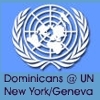

| BRIEFING - February 22, 2012 | To learn more about the Millenium Development Goals, click on the graphic Past Briefings: February 8, 2012 January 25, 2012 January 11, 2012 December 21, 2011 December 7, 2011 November 9, 2011 October 19, 2011 October 5, 2011 September 21, 2011 September 7, 2011 August 24, 2011 August 10, 2011 June 22, 2011 June 8, 2011 May 11, 2011 April 27, 2011 April 6, 2011 |
|
Commission focuses on empowerment of rural women The Commission on the Status of Women will be in session from Feb. 27–March 9 here in New York. The priority theme will be “The empowerment of rural women and their role in poverty and hunger eradication, development and other challenges.” Before addressing the importance of this theme, I would like to give you some brief history of the commission itself. When the UN Charter was signed in 1946, there were only four women among the original 160 signatories. However, these women succeeded in inscribing women’s rights within the Charter of the United Nations, which affirms in its preamble, “faith in fundamental human rights, in the dignity of the human person, in the equal rights of men and women and of Nations large and small.” During the inaugural meetings of the UN General Assembly, held in London in February 1946, Eleanor Roosevelt, a U.S. delegate, read an open letter addressed to “the women of the world”:
Shortly afterward, a sub-commission dedicated to the Status of Women was formally established under the Commission of Human Rights. However, many women delegates and representatives of non-governmental organizations felt strongly that a separate body specifically dedicated to women’s issues was necessary. In June 1946, the sub-commission was formally recognized as the Commission on the Status of Women, dedicated to ensuring women’s equality and to promoting women’s rights. During its first session, the commission established as one of its guiding principles:
Over the years, the commission has worked diligently to provide women universal access to political rights; to remove discrimination in marriage; to advocate for women’s literacy and equality in access to education; to focus on the issue of traditional practices harmful to women and girls—including female genital mutilation, which has finally been recognized as a form of violence against women/girls. The commission’s efforts have increasingly focused on the role of women in development, both as beneficiaries and as agents of change. One of the greatest achievements of the Commission on the Status of Women was the Fourth World Conference on Women, held in Beijing, in 1995. This conference significantly advanced the global agenda for women’s human rights and gender equality. The areas highlighted in the subsequent Beijing Platform for Action include women and poverty; education and training of women; women and health; violence against women; women and armed conflict; women and the economy; women in power and decision-making women and human rights; women and the media; women and the environment; the girl-child; and the institutional mechanisms for the advancement of women. Each year at its annual session, the commission reviews progress in the implementation of these critical areas, and makes appropriate recommendations to enhance ongoing progress. As mentioned previously, this year’s theme will focus on the empowerment of rural women and the crucial role they play in the fight to eradicate poverty and hunger. In his report on the topic, the Secretary General reminds us that rural women hold much of the knowledge needed to increase food security, prevent environmental degradation and maintain agricultural biodiversity. They are the custodians and users of traditional knowledge, including on climate resilience, and they are the managers of seeds. He goes on to say that:
However, in order for both women and agriculture to flourish, there a number of gender constraints that must be removed—namely, securing women’s legal rights to land, and securing their access to credit and markets. These are among the significant issues that the commission will be dealing with in its proceedings. Our Dominican Volunteer, Alexandra Sajben, will share with you the important work of the NGO Working Group on Girls, and its significant contribution to the work of the commission, in the next Briefing.
|
Dominican Leadership Conference
Building relationships and collaborating in the mission of preaching the Gospel
29000 West Eleven Mile Road
Farmington Hills MI 48336
248-536-3234 Contact: Executive Director
